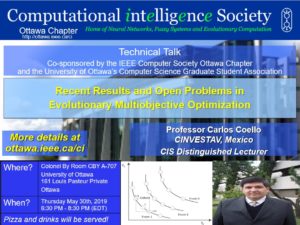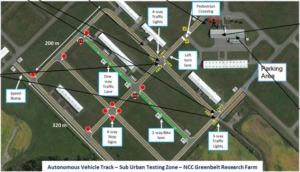Events

You are invited to the technical talk entitled
Recent Results and Open Problems in Evolutionary Multiobjective Optimization
Date
Thursday May 30th, 2019
Time
6:15 PM Arrival and networking (light snacks available)
6:45 PM Approximate start of talk (40-60 mins)
7:45 – 8:00 PM Q&A period
8:00 – 8:30 PM Post-talk networking and discussion
Location
Colonel By (CBY) A-707
Faculty of Engineering
University of Ottawa
161 Louis Pasteur Private, Ottawa, K1N 6N5
admission is free but registration is required on EventBrite
Speaker
Professor Carlos Coello, CINVESTAV-IPN, Mexico, IEEE CIS Distinguished Lecturer
Abstract
Evolutionary algorithms (as well as a number of other metaheuristics) have become a popular choice for solving problems having two or more (often conflicting) objectives (the so-called multi-objective optimization problems). This area, known as EMOO (Evolutionary Multi-Objective Optimization) has had an important growth in the last 15 years, and several people (particularly newcomers) get the impression that it is now very difficult to make contributions of sufficient value to justify, for example, a PhD thesis. However, a lot of interesting research is still under way. In this talk, we will review some of the research topics on evolutionary multi-objective optimization that are currently attracting a lot of interest (e.g., handling many objectives, hybridization, indicator-based selection, use of surrogates, etc.) and which represent good opportunities for doing research. Some of the challenges currently faced by this discipline will also be delineated.
Speaker Biography
Carlos Artemio Coello Coello received a PhD in Computer Science from Tulane University (USA) in 1996. His research has mainly focused on the design of new multi-objective optimization algorithms based on bio-inspired metaheuristics, which is an area in which he has made pioneering contributions. He currently has over 470 publications which, according to Google Scholar, report over 43,900 citations (with an h-index of 83). He has received several awards, including the National Research Award (in 2007) from the Mexican Academy of Science (in the area of exact sciences), the 2009 Medal to the Scientific Merit from Mexico City’s congress, the Ciudad Capital: Heberto Castillo 2011 Award for scientists under the age of 45, in Basic Science, the 2012 Scopus Award (Mexico’s edition) for being the most highly cited scientist in engineering in the 5 years previous to the award and the 2012 National Medal of Science in Physics, Mathematics and Natural Sciences from Mexico’s presidency (this is the most important award that a scientist can receive in Mexico). He is also the recipient of the prestigious 2013 IEEE Kiyo Tomiyasu Award, “for pioneering contributions to single- and multiobjective optimization techniques using bioinspired metaheuristics” and of the 2016 The World Academy of Sciences (TWAS) Award in “Engineering Sciencesâ€. Since January 2011, he is an IEEE Fellow. He is also Associate Editor of several journals including the two most prestigious in his area: IEEE Transactions on Evolutionary Computation and Evolutionary Computation. He is currently Vicepresident for Member Activities of the IEEE Computational Intelligence Society (CIS), an IEEE CIS Distinguished Lecturer and Full Professor with distinction at the Computer Science Department of CINVESTAV-IPN in Mexico City, Mexico.
Fields-CQAM Public Lectures: Ali Ghodsi, University of Waterloo
What is missing from common practice in machine learning?
AI, and machine learning in particular, is enjoying its golden age. Machine learning has changed the face of the world over the past two decades but we are still a long way from achieving a general artificial intelligence. In this talk, I will discuss a couple of elements that I believe are missing from common practice in machine learning, including incorporating causality and creating a new framework for unsupervised learning.
Biography

Ali Ghodsi is a Professor in the Department of Statistics and Actuarial Science at the University of Waterloo. His research involves statistical machine-learning methods. Ghodsi’s research spans a variety of areas in computational statistics. He studies theoretical frameworks and develops new machine learning algorithms for analyzing large-scale data sets, with applications to bioinformatics, data mining, pattern recognition, robotics, computer vision, and sequential decision making.
DATE:
THURSDAY, JUNE 20TH, 2019.
PRESENTATION
6:00 PM – 7:00 PM.
NETWORKING
7:00 PM – 8:00 PM.
LOCATION
HEALTH SCIENCE BUILDING, RM. 1301 (LOCATED ON THE GROUND FLOOR), CARLETON UNIVERSITY.
FREE ADMISSION FOR THIS PUBLIC LECTURE.
PLEASE REGISTERÂ HERE.

| 8:30 am – 9:00 am | Registration | ||
|---|---|---|---|
| 9:00 am – 9:15 am | Opening Remarks | Rafik Goubran | Carleton University |
| 9:15 am – 10:00 am | Keynote Presentation:
Data Mining and Machine Learning for Authorship and Malware Analyses |
Benjamin C. M. Fung Biography |
McGill University |
| 10:00 am – 10:30 am | Break | ||
| 10:30 am – 11:45 am | Cybersecurity: Top 5 class imbalance ML challenges and data sets Abstract |
Stephan Jou Biography |
Interset |
| Class Imbalance in Fraud Detection Abstract |
Robin Grosset Biography |
MindBridge Analytics Inc. | |
| Handling class imbalance in natural language processing Abstract |
Isuru Gunasekara Biography |
IMRSV Data Labs | |
| 11:45 am – 12:45 pm | Lunch | ||
| 12:30 pm – 2:10 pm | Adaptive learning with class imbalanced streams Abstract |
Herna L. Viktor Biography |
University of Ottawa |
| Radar-based fall monitoring using deep learning Abstract |
Hamidreza Sadreazami Biography |
McGill University | |
| Privacy-preserving data augmentation in medical text analysis Abstract |
Isar Nejadgholi Biography |
National Research Council | |
| Failure modelling of a propulsion subsystem: unsupervised and semi-supervised approaches to anomaly detection Abstract |
Julio J. Valdés Biography |
National Research Council | |
| 2:10 pm – 2:25 pm | Break | ||
| 2:25 pm – 3:40 pm | TBD | Reddy Nellipudi | DB Schenker |
| AuditMap.ai: Hierarchical Sentence Classification in Unstructured Audit Reports Abstract |
Daniel Shapiro Biography |
Lemay.ai | |
| Deep Learning techniques for unsupervised anomaly detection Abstract |
Dušan Sovilj Biography |
RANK Software Inc. | |
| 3:40 pm – 3:50 pm | Closing Remarks |
Advanced Optical Sources for Spectrally Efficient Photonic Systems
Liam Barry,
Dublin City University
Â
Abstract
The continuing growth in demand for bandwidth (from residential and business users), necessitates significant research into new advanced technologies that will be employed in future broadband communication systems. Two specific technologies which are becoming increasingly important for future photonic
systems are wavelength tunable lasers and optical frequency combs. Although these topics have been studied for over two decades their significance for the development of future ultra-high capacity photonic systems has only recently been fully understood. Wavelength tunable lasers are currently becoming the
norm in optical communication systems because of their flexibility and ability to work on any wavelength. However, as their operating principles are different to standard single mode lasers they can effect how future systems will operate.
For example as optical transmission systems move towards more coherent transmission (where the data is carried using both the intensity and phase of the optical carrier), the phase noise in these tunable lasers will become increasingly important. Optical frequency combs also have many applications for
future photonics systems, and for telecommunications they can be used to obtain the highest spectral efficiency in optical transmission systems by employing the technology of optical frequency division multiplexing (OFDM) that has been widely employed to increase spectral efficiency in wireless systems. Wavelength tunable lasers and optical frequency combs are thus topics at the leading edge of current photonics systems research, and their detailed understanding promises new applications in all-optical signal processing, optical sensing and metrology, and specifically telecommunications. This talk will focus on the development and characterization of various wavelength tunable lasers and optical frequency combs, and then outline how these sources can be employed for developing optical transmission systems and networks which make the best use of available optical spectrum.
Bio
Liam Barry received his BE (Electronic Engineering) and MEngSc (Optical Communications) from University College Dublin and his PhD from the University of Rennes. His main research interests are: all-optical signal processing, optical pulse generation and characterization, hybrid radio/fibre communication
systems, wavelength tuneable lasers for reconfigurable optical networks, and optical performance monitoring. He has worked as a Research Engineer in the Optical Systems Department of France Telecom’s Research Laboratories (now known as Orange Labs), and a Research Fellow at the Applied Optics Centre in Auckland University. He is currently a Full Professor in the School of Electronic Engineering at Dublin City University, establishing the Radio and Optical Communications Laboratory, and is a Principal Investigator for Science Foundation Ireland. He has published over 500 articles in internationally peer reviewed journals and conferences, holds 9 patents in the area of optoelectronics, and has co-founded two companies in the photonics sector.

Ottawa Life Member Affinity Group presents:Â Ottawa L5, the first integrated Connected & Autonomous Vehicle (CAV) test environment in North America.
The Ottawa L5 private test track is a 1,866 acre, fenced and gated private facility with 16 kilometres of paved roads. The largest secure test facility for CAVs in Canada, the Ottawa L5 private test track creates an ideal proving ground for the safe and productive pre-commercial development, testing, validation and demonstration of CAV technologies. The Ottawa L5 testing facilities are equipped with GPS (RTK), dedicated short range communications (DSRC), Wi-Fi, 4G/LTE and 5G telecommunications and networking infrastructure, making it the first integrated CAV test environment of its kind in North America. Find more information at:Â https://www.investottawa.ca/ottawal5
Tour will last about an hour involving a walk around the site and a group discussion of various technical aspects of the L5 facility. An additional treat is the possibility of an autonomous shuttle ride at the site for some attendees.
Please register in advance with wolfram.lunscher@ieee.org by Friday October 11. Priority will be given to Life members. All members and family are welcome. There is an online liability waiver to be signed. The link will be provided to registrants.

